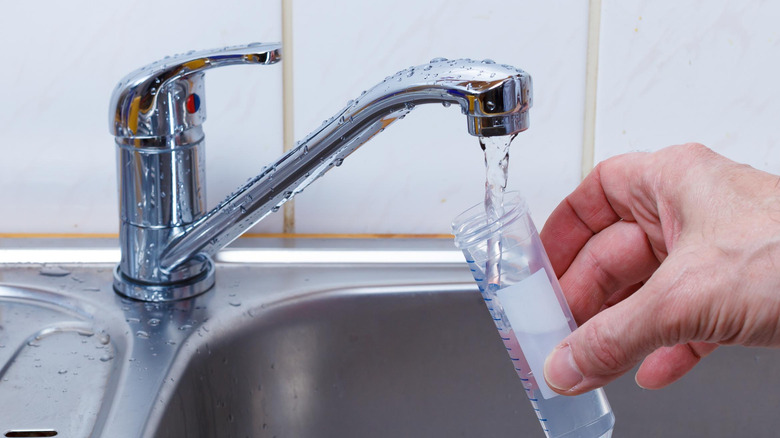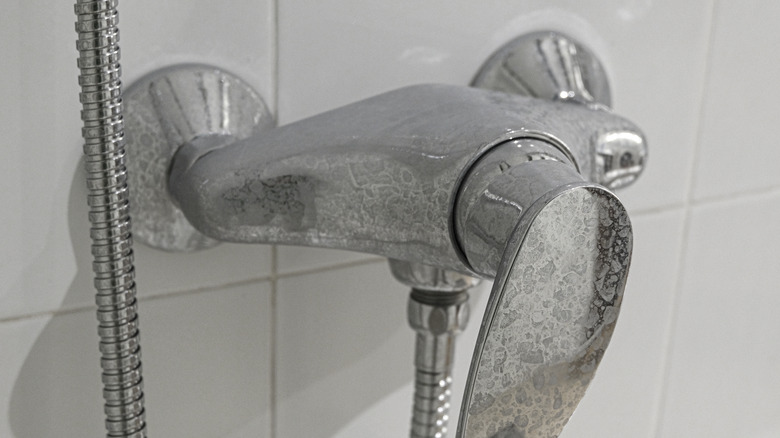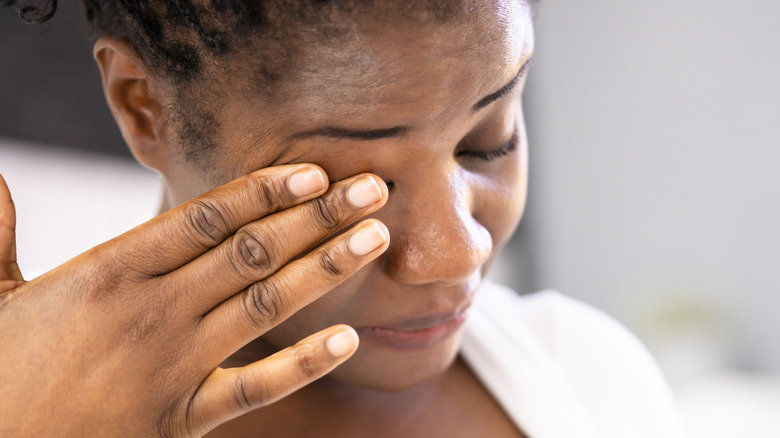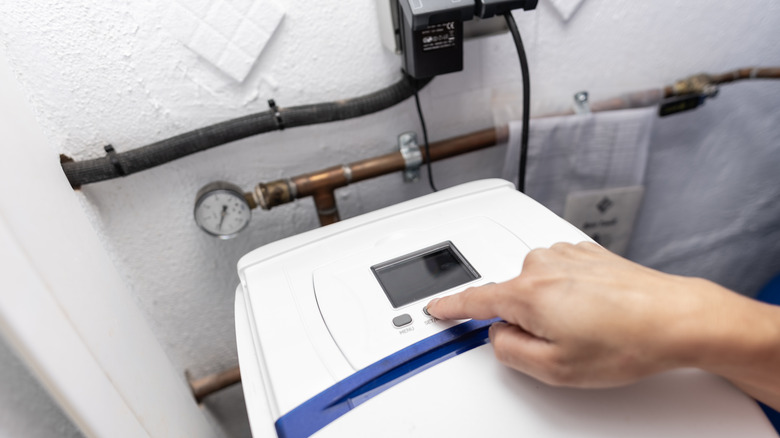What It Means When Your Eyes Itch After Getting Out Of The Shower
Every time you get out of the shower, your eyes itch like crazy. You also notice that your dishes are a bit cloudy when you pull them out of the dishwasher. Rather than thinking you have dry eyes or maybe it's something in your soap, you should start to consider your water. Before diving into why your water might irritate you, understanding the different tap water types is essential.
The Centers for Disease Control and Prevention (CDC) divides water into two types. Public water systems can be found in larger communities and cities. The water is pulled from a central source and serves many different households simultaneously. A private well is dug or driven to draw water from an underground aquifer. Public drinking water is tested by the water facility that puts it into the homes, while private water relies on the owner to test it. Depending on your water source, different contaminants or allergens can slip in, causing your eyes to get itchy and dry. It can also affect your skin.
We'll take you through the different water issues that can lead to itchy eyes when you shower. Then, we'll walk you through how to treat it so your eyes have a fresh start.
The water is disinfected with chlorine
According to the Centers for Disease Control and Prevention (CDC), public drinking water comes from many sources, like lakes and wells contaminated with bacteria and heavy metals. Chlorine or chloramine is added to drinking water to kill these germs, in a process called "chlorination." The government regulates the process to ensure the levels are no higher than 4 milligrams per liter (4 ppm) of chlorine or chloramine. This level ensures the water is still safe for consumption but that the germs are gone.
It helps to kill the germs, but chlorine can have some unexpected effects on your eyes and skin, even at low levels. The Minnesota Department of Health (MNDH) notes that chlorine doesn't enter your skin through showering; however, some people are extremely sensitive, leading to skin irritation. It can also affect your eyes. It could be from the water dripping into your eyes or from the vapor it creates in the hot shower since disinfection byproducts can be absorbed through the skin and go into the eyes when you are showering, says MNDH.
Additionally, ophthalmologist Richard Gans, M.D. stated to Cleveland Clinic, "Chlorine can make your eyes a little red, teary, and sensitive to light for a couple of hours after you are in a pool or playing at a water park." While the chlorine in drinking water is much less than that in pools, it can still affect those extremely sensitive to chlorine.
You have hard water
Not all water systems are created equal, especially regarding well water. Since you're pulling water from the ground, it can contain different contaminants and minerals. For example, anything absorbed into the ground, like pesticides and runoff, can make it into your tap water. Additionally, groundwater can contain high levels of minerals like calcium and magnesium, known as "hard water" (per U.S. Geological Survey).
Hard water doesn't react to soaps like water with fewer minerals (soft water) would. Therefore, it can leave residue on your skin and your bathtub. According to Biard & Crocket Plumbing, Heating, and Air Conditioning, the stearic acid in soap binds with the minerals to create soap scum. Therefore, when you lather up, both your tub and you get a nice residue left behind. They also note that hard water makes it harder to lather the soap, affecting its cleaning capacity.
The residue makes your eyes and body dry and itchy when you leave the shower. Even without soaping up, the excess minerals in the water can also lead to your eyes stinging. APEC Water suggests keeping showers short, using warm water, and trying mild cleansers to help with the situation.
Irritants in the water are leading to eye dermatitis
City water is tested regularly for contaminants, and the water is adjusted to deal with those contaminants at the testing facility, but they can still slip in. Well water can also contain contaminants without you knowing it unless you regularly test it. The U.S. Environmental Protection Agency (EPA) states that four contaminants can be found in water from runoff, sewer overflows, storms, rocks, and wildlife. Physical contaminants include sediment and minerals, while chemical contaminants are elements or chemical compounds like lead or nitrates. You might also have biological contaminants like E. coli. Some water systems might also include radiological contaminants.
Any contaminant within your water can be a potential irritant or allergen, leading to eyelid dermatitis. According to the Cleveland Clinic, this type of contact dermatitis develops on the sensitive skin above your eyelid. It can lead to dry skin, flaking, itching, and dry eyes. It's typically from contact with an irritant or allergen. This publication also noted that 15%-20% of people have experienced eyelid dermatitis in their lives. Treatment includes corticosteroids, moisturizers, and avoiding the irritant. Medical News Today also recommends using less soap when taking a shower. Therefore, it's important not to rub your eyes but rather blot them dry.
Water treatment methods to reduce itchy eyes
Depending on what's causing your itchy eyes, taking shorter showers and using less soap can help limit your exposure. However, you can also install a water filtration system in your home to eliminate the problem.
Removal of chemical contaminants, like chlorine and pesticides, requires a granular activated carbon (GAC) filter, per US Water Systems. This system captures those compounds in the filter so they aren't transported to your drinking water. When hard water is the issue, a water-softening treatment might be your best bet. These use filters to move the calcium and magnesium from the water by exchanging them for sodium ions. Bacteria issues, like E. coli, can require using an ultraviolet system to kill the bacteria before it hits the tap. Fresh Water Systems states that your water expert might also recommend reverse osmosis for removing metals and other toxic chemicals.
Depending on the quality of your water, you might require a combination of filtration systems to alleviate your itchy eyes. So, when your eyes are constantly itchy after a shower, have your water checked by a professional to see if it's causing your issue.





